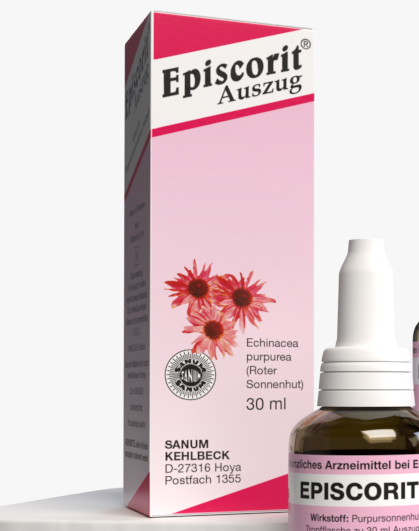EPISCORIT ®Drops
Respiratory and other recurrent infections
SYSTEM-REGULATION | Phyto-Preparation
Many herbal and homeopathic remedies to strengthen the immune system meanwhile contain echinacea. The active ingredient in EPISCORIT ®, red coneflower (Echinacea purpurea), is used worldwide to strengthen and protect the immune system, particularly because it stimulates the proliferation of white blood cells that specialize in defending against pathogens. EPISCORIT ® thus promotes the body's natural defenses and supports the function of the urinary tract and upper respiratory tract. However, coneflower best exerts this effect preventively, and EPISCORIT ® should be taken at the first signs of a cold.
Since stimulation of the immune system is not always useful or wanted, there are some diseases in which the immune system must not be stimulated. Please consider the list of diseases in the contraindications.
Within the elements of SANUM therapy it belongs to the medicines of SYSTEM-REGULATION.
If colds, bladder infections or other infections occur again and again, there is probably an immune deficiency behind them. The typical symptoms of these recurring (recurrent) infections are annoying and sometimes very distressing. But what is a cold? A cold is an infection of the upper respiratory tract with viruses (rarely with bacteria), mostly rhinoviruses, which can be transmitted via droplet infection (sneezing, coughing). Two to five days pass between infection and the outbreak of the disease (incubation period). The infection then usually develops in a descending manner: first, the viruses attack the mucous membranes of the nose and throat. The disease is usually harmless and lasts about a week. It usually occurs in the fall and winter months. On average, every adult gets a cold two to four times a year, children between six and ten times, with small children being affected more frequently.
Recurrent infections in the area of the urinary tract:
If more than two urinary tract infections, or bladder infections, occur in a person within a year, they are referred to as frequently recurring, recurrent urinary tract infections. The terms "chronic urinary tract infection" or "chronic cystitis" are also often used. Due to the shorter urethra, recurrent UTIs occur predominantly in women. This is primarily caused by women's shorter urethra. The short urethra allows bacteria or fungi to enter the bladder more quickly or to ascend more easily. The most frequent causes of recurrent infections are the carry-over of pathogens, faulty hygiene or excessive intimate hygiene that disrupts natural protective mechanisms, a change in hormonal balance during menstruation or menopause and advanced age, frequent sexual intercourse, the use of a spermicidal (sperm-killing) vaginal cream and a fixed urinary catheter. But anatomical causes such as scarring or tumors in the urinary tract, congenital malformations or enlargement of the prostate (prostatic hyperplasia) can also be behind recurrent UTIs. The typical symptoms of a urinary tract infection are pain and burning during urination, blood in the urine and a general feeling of illness. In severe cases, the urinary tract infection may also be accompanied by fever and chills.
Treatment of more than 8 weeks depends on the advice of the physician or health care professional.
EPISCORIT ® - Liquid Dilution
Composition: 100 ml liquid dilution contain: Medically active substance: 75.6 ml concentrate from fresh, blooming Echinacea purpurea herbs (1.5 - 2.5 : 1). Other constituents: ethanol.
Indication: Support of treatment of recurrent infections of the respiratory and urinary tract.
Contraindications: This preparation should not be administered if cases of hypersensitivity against any of the ingredients, exipients or compositae are known. Furthermore, it should not be administered in patients with progressive systemic diseases such as tuberculosis, leucosis or similar diseases, inflammatory diseases of the connective tissue (collagenosis), multiple sclerosis, AIDS, HIV infections, other chronic viral illnesses and autoimmune diseases.
Side effects: Occasionally signs of a hypersensitivity reaction may occur. For drugs containing Echinacea, symptoms like skin irritation, itching, facial swelling, shortness of breath, dizziness, drop in blood pressure are known. In this case, discontinue medication and treat symptomatically.
Warning:
This product contains 22 % (v/v) alcohol (ethanol).
Due to the alcohol content, professional medical advice should be sought prior to recommending this product to patients with alcohol or liver problems.
Manufacturer: SANUM-Kehlbeck GmbH & Co. KG, Postfach 1355, 27316 Hoya.





